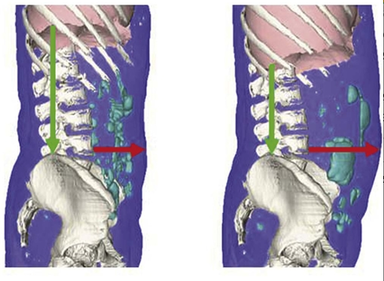Why do I feel bloated?
Bloating is a sensation of increased pressure. The sensation is due to the abnormal sensitivity of the intestinal tract typically found in patient with irritable bowel syndrome. The nervous system of your intestinal tract is not reacting properly leading to a sensation of excess gas pressure. Treating bloating is similar to the treatment of irritable bowel syndrome.
But sometimes my stomach looks like I am 9 months pregnant?
This situation is called abdominal distention and unfortunately it can be very uncomfortable and embarrassing for a patient.
The cause of abdominal distention is more complex. It is not because of excessive intestinal gas. It is actually caused by a paradoxical contraction of the diaphragm and relaxation of the abdominal wall muscles. This leads to the abdominal contents shifting forward.
The cause of abdominal distention is more complex. It is not because of excessive intestinal gas. It is actually caused by a paradoxical contraction of the diaphragm and relaxation of the abdominal wall muscles. This leads to the abdominal contents shifting forward.
|
The image on the left is the normal state and on the right is during abdominal distention, Notice how the diaphragm is lower and the abdominal wall is looser on the right leading the intestines to shift forward.
This type of abdominal distension can typically last for a few hours and resolve spontaneously. Some patients will have clear triggers such as food or stress while others have typical times during the day that they will get distended. It can also occur more frequently for women around their menstrual periods. |
Is bloating ever a sign of something serious?
Thankfully, the type of bloating and distension described above is rarely related to anything serious.
If you first develop abdominal bloating or distension and you are over the age of 40, you should see your doctor, especially if it is persistent or associated with new symptoms such as pain or constipation.
An investigation of your colon with either a colonoscopy or a CT colonography should be considered as well as an ultrasound or CT scan of the general abdomen. For women, I would include an investigation of the gynecological organs with a pelvic ultrasound or CT scan or even better an endovaginal ultrasound and a visit with a gynecologist.
If you first develop abdominal bloating or distension and you are over the age of 40, you should see your doctor, especially if it is persistent or associated with new symptoms such as pain or constipation.
An investigation of your colon with either a colonoscopy or a CT colonography should be considered as well as an ultrasound or CT scan of the general abdomen. For women, I would include an investigation of the gynecological organs with a pelvic ultrasound or CT scan or even better an endovaginal ultrasound and a visit with a gynecologist.
|
www.ourdigestivehealth.com
www.GadFriedman.com |


